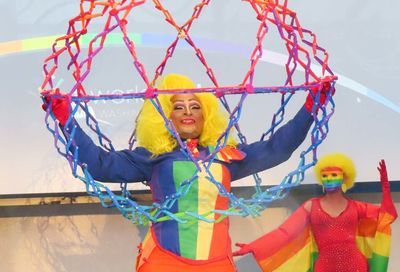Whitney Houston’s 50th birthday – celebrating her best moments
August 9, 1963, Whitney Houston was born in Newark, NJ. She would have turned 50 today. Surely she would have celebrated in style. Instead of dwelling on the sad end to her story, let’s focus on the remarkable legacy of music that she created. Music fans will be listening in amazement to Whitney Houston long after all of us are gone. At her best, she was extraordinary. She had a voice and a presence that was untouchable. In tribute to Whitney Houston’s memory on her 50th birthday, here are 10 of her essential recordings:
1. I Will Always Love You
Released: November 3, 1992, Billboard Peak #1 on Hot 100
Yeah, I know this track is responsible for countless hours of bad, drunken 1:00 a.m. karaoke. But hey, those bars are asking for it by including it in the books. The fact is that, along with “And I’m Telling You I’m Not Going,” “I Will Always Love” – particularly Whitney’s rendition – is THE song to try and attempt if you really want to wow someone as a vocalist. When someone tries it on American Idol or some other talent show, you sit up and take notice. It’s the gold standard. And if you can’t nail it, you better not bother trying, cuz you’ll only end up looking like a fool. Yeah, this song spent a then-record 14 weeks at #1 during the winter of 92/93. Yeah, it was overplayed. But have you actually listened to this song lately? It truly IS remarkable. It was an instant classic the moment the production team hit “stop” in the control booth. “I Will Always Love You” is Whitney at her very best. The remarkable strength of her voice, the phenomenal control, the beautiful tone – and dammit all you can say really is that she fucking nails it. Credit goes to producer David Foster, too. From the gorgeous a cappella opening, to the sparse and lovely arrangement, he allows Whitney’s glorious vocal performance the center stage where it belongs.
2. I Wanna Dance With Somebody (Who Loves Me)
Released: May 2, 1987, Billboard Peak #1 on Hot 100
This was a big single for Whitney. Yeah, her debut album spawned 3 number one hits and an additional Top 10, but would she flame out after one album or keep the success going? She quickly answered that question with another #1 single. For the first single from her 2nd album “Whitney,” she returned the pop songwriting team of George Merrill and Shannon Rubicam who had penned her prior smash “How Will I Know.” The result is upbeat, fun and catchy, and it became one of the key tracks for the summer of 1987. It’s a song that, 26 years after is release, still has the power to get a room of people (even late at night at a club) singing, dancing and waving their arms in the air. A classic in every sense of the word.
3. Greatest Love of All
Released: March 14, 1986, Billboard Peak #1 on Hot 100
Originally recording by George Benson for the late 70s Muhammad Ali film “The Greatest,” Whitney’s rendition of “The Greatest Love of All” – released as the final single from her smash debut album – elevated her stature and success to a new level. She’d already had two #1 singles, but this one is the track that really allowed her to enter the consciousness of a vast portion of the record-buying public. The song was everywhere. Sure, it has a certain sappiness to it – perhaps producer (and original songwriter) Michael Masser could have gone with a less syrupy string arrangement – but Whitney makes it sound like a standard that has always been a part of the pop pantheon. She owns it.
4. Saving All My Love For You
Released: August 13, 1985, Billboard Peak #1 on Hot 100
This elegant ballad was the first inkling that many had as to what an amazing vocalist Whitney Houston really was. The 2nd single from her debut album, this track saturated the radio and MTV airwaves, and became the first of her eleven #1 singles on the US pop charts.
5. It’s Not Right, But It’s Okay
Released: January 25, 1999, Billboard Peak #4 on Hot 100
It’s all about the Thunderpuss Mix. Yeah, it was overplayed in clubs back in the day, but it stillsounds great and still gets a guaranteed positive reaction. People still love to dance to it. “It’s Not Right, But It’s Okay,” from the “My Love is Your Love” album, hit #4 on the pop charts but was #1 on the dance charts, and it’s one of those rare cases in which the remix is better known than the single version. Whitney had started her career with something of an “America’s Sweetheart” image; that was no longer the case here. This is the kind of defiant track that Beyonce and Destiny’s Child would later make a career our of recording.
6. All the Man That I Need
Released: December 4, 1990, Billboard Peak #1 on Hot 100
This ballad, written in the early 80s, had already been a minor hit for 2 different artists by the time Whitney wrapped her remarkable voice around it. She delivered a stunning vocal, and it became the second single from her third album “I’m Your Baby Tonight,” and yet another #1 smash. Whitney Houston at her most powerful.
7. You Give Good Love
Released: February 22, 1985, Billboard Peak #3 on Hot 100
“You Give Good Love” was primarily aimed at R&B radio when it was chosen as the first single from her debut album, but it became a surprise pop smash, gliding all the way to #3. A lovely easy-listening ballad, it shows moments of Whitney’s vocal prowess and charm, but listening to this now one would be hard-pressed to think that it would launch such a massively successful and lengthy career. With her first two major singles both ballads, she was in danger of being pigeon-holed as an adult contemporary artist or balladeer, but fortunately the uptempo number “How Will I Know” was available and it followed the ballads to the upper reaches of the singles chart.
8. Exhale (Shoop Shoop)
Released: November 7, 1995, Billboard Peak #1 on Hot 100
Theis track, written and produced by Babyface, debuted all the way up at #1 on the US singles charts – a rare feat. “Exhale” is a gentle ballad with a nice old-school vibe with the “shoop” refrain. From the successful film “Waiting to Exhale,” in which Whitney also starred, the song shared a soundtrack with artists such as TLC, Brandy, Toni Braxton, Mary J. Blige, Patti LaBelle, Aretha Franklin, and others. Whitney’s forays into acting tended to be a bit more successful than your average pop star. No, she didn’t win any Oscars for her acting skills, but she proved she could hold her own with the pros on the big screen.
9. My Love Is Your Love
Released: July 3, 1999, Billboard Peak #4 in Hot 100
When the “My Love is Your Love” album finally appeared in November, 1998, it was Whitney’s first non-soundtrack studio album since “I’m Your Baby Tonight” eight years previously. She went for a much more modern sound on this album, working with a variety of different producers, and issuing multiple remixes for the various singles. The album became a massive success, spawning 5 Top 40 hits including the #2 “Heartbreak Hotel” and the title track, which peaked at #4 during the Summer of 1999.
10. Didn’t Know My Own Strength
Released: August 28, 2009
What can be said about Whitney’s remarkable 2009 comeback album “I Look To You”? Yeah, the voice was different. She was older, and had been through a lot (to say it vey mildly). Was it Clive Davis trying to push her out there before she was ready in order to help her recoup some money to pay her debts? (One can only cringe thinking aout those YouTube clips of some of the live performances from around this time). Who knows. But the album was a #1 success, and this Diane Warren song – which, although it wasn’t a single, was the first track to appear on the internet – was a note-perfect comeback. She sounds weathered, but defiant and hopeful. She sounds like she’s back, and maybe all is well – and all will be well. We all wanted to believe it.
Support Metro Weekly’s Journalism
These are challenging times for news organizations. And yet it’s crucial we stay active and provide vital resources and information to both our local readers and the world. So won’t you please take a moment and consider supporting Metro Weekly with a membership? For as little as $5 a month, you can help ensure Metro Weekly magazine and MetroWeekly.com remain free, viable resources as we provide the best, most diverse, culturally-resonant LGBTQ coverage in both the D.C. region and around the world. Memberships come with exclusive perks and discounts, your own personal digital delivery of each week’s magazine (and an archive), access to our Member's Lounge when it launches this fall, and exclusive members-only items like Metro Weekly Membership Mugs and Tote Bags! Check out all our membership levels here and please join us today!


















